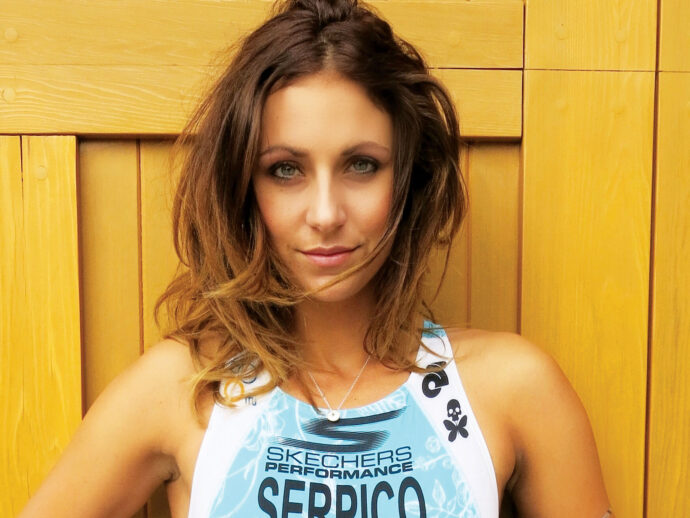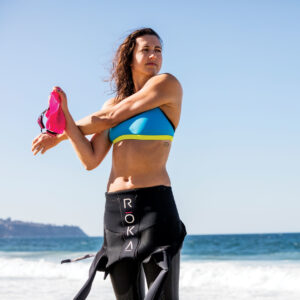
From NFL superstars to Olympic gold medallists, these athletes ditched meat for plants and are now shattering stereotypes and world records.
A new wave of athletes is beating old records—swimming more swiftly, lifting heavier weights, and running faster. These plant-based athletes’ journeys can inspire our own meat-free pursuits of fitness and optimal health.
Run, swim, bike, and eat plants
Madi Serpico
Elite triathlete Madi Serpico went vegan for ethical reasons and was surprised by the health effects. “Almost immediately, my energy levels increased,” she says. “My hormones [used to be] out of balance, and within a month I was feeling like a whole different person.”
Serpico has been a winner or top finisher at the Pan American Cup, Canadian National Championships, and more, and she says her diet plays a key role in her success: “I recover much quicker after a hard workout, and because I’m eating cleaner, my weight doesn’t fluctuate, which helps with consistency in racing and training.”
To fuel up before exercise, Serpico loves gluten-free oatmeal combined with fruit, nuts, and flaxseed. “I never go anywhere without it,” she says. “I like eating it in the morning after a hard swim set.”
“Try a 30-day vegan challenge and you will see how amazing you feel,” Serpico suggests. “You won’t go back!”
A wide receiver wide open to something new
Griff Whalen
“A healthy plant-based diet has had an extremely positive effect on my athletic performance and overall health,” says Griff Whalen, a wide receiver who’s played for the Miami Dolphins and San Diego Chargers. “I’ve become stronger, leaner, and faster, all critical for my career. I feel much less soreness in my joints and tendons, feel like I can breathe easier while training or competing, and feel more recovered the next day.”
One of Whalen’s go-to vegan staples is coconut water, which he drinks before, during, and after exercise. “I’ll often mix other things with it, like spirulina or lemon juice,” he says. “Spirulina adds amino acids, and lemon juice is alkalizing.”
This NFL athlete has convinced many people to give veganism a try, including his teammates. “My biggest recommendation is to educate yourself … and find some great resources,” Whalen says, since the switch can be quite a change. “Have someone help you make a plan … so you can be successful.”
Plants for the gold
Rebecca Soni
Rebecca Soni has won dozens of medals at the world’s top international swimming competitions, including three Olympic gold medals. She switched to a plant-based diet simply to try something new. “I thought it would be a fun challenge,” she says. The positive results were more than she’d imagined.
“The breakthrough was realizing how sluggish animal foods made me, and especially the effect of dairy on my allergies,” she says. “When I dropped the allergy meds I’d been taking for 15 years, I knew I was onto something good!
“I just feel better. My mood is lighter. I’m more ready to take on anything. I feel I can go for longer, whether it’s a run, a swim, or anything else. I recover faster—soreness is much less intense and passes quickly. And I have a growing respect and connection to all people and living beings.”
Soni starts every morning with a vegan smoothie, adding superfoods such as hemp and chlorella. “The most important is the greens,” she notes, such as spinach and chard. “Blended greens are much easier to digest than simply munching on them.”
Soni says the top worry she hears from people is about having to give up cheese. “I was a cheese lover in my past too,” she laughs. “Focus on what you have to look forward to, not what you’re missing out on.”
A swell idea
Tia Blanco
Tia Blanco was crowned champion at the last World Surfing Games, an accomplishment she also attained in 2015. This sets her up to compete in the 2020 Summer Olympic Games, the first time surfing will appear at the Olympics.
“I’ve been vegan for three years now,” says Blanco. She made the jump after watching Forks Over Knives and similar documentaries on traditional Western diets.
“Prior to being vegan, I ate a lot of dairy products that made me fatigued,” she recalls. “Cutting the dairy helped with my energy levels. I feel lean and toned from a plant-based diet.”
Blanco has become an advocate for a vegan lifestyle, doing ads for People for the Ethical Treatment of Animals and appearing in documentaries, such as the sequel to Leonardo DiCaprio’s Cowspiracy (2014). “I’m [a huge fan] of the team that produces the documentaries, so for me it was a no-brainer to be involved,” she says. “I want [viewers] to take away that eating a plant-based diet will benefit your health.”
A lean, green fighting machine
Cam F. Awesome
Heavyweight boxer Cam F. Awesome—a four-time USA Boxing national champion and self-proclaimed peanut butter addict—did a vegan challenge when he lost a bet. He hated the first few weeks as he went through junk food withdrawals, but then he began feeling better and turned the challenge into a lifestyle.
“Since becoming vegan, I’ve learned how to realize what my body needs,” says Awesome. “My goal is to change what a ‘vegan’ is considered. You can be vegan and cool and strong.”
While many of us may think being plant based is an all-or-nothing switch, Awesome sees no problem easing into it. “I’m 100-percent vegan,” he says, “and I understand that not everyone wants to make that commitment. If you just eat plant-based once a week, you can be one-seventh healthier!”
Veggie marathons
Jackie Merritt
“When you look at the science,” says ultrarunner Jackie Merritt, a doctor of physical therapy with a PhD in biomechanics and movement science, “data indicates there’s only one diet that’s been consistently shown to promote long-term health and reduced risk of disease: a whole foods, plant-based diet.”
Merritt, who has completed approximately 40 ultramarathons in the last seven years, switched to a plant-based diet after reading The China Study. Going vegan has improved her long weekly running mileage and sped up her recovery.
She fuels up daily with chia seeds added to her smoothies. “I also love pumpkin seeds,” she says. “[They’re] a great source of iron and B vitamins, which are particularly important to the training and competing athlete.
Vegan nutrition 101
Registered dietitians agree: there’s no evidence backing the stereotype that we need animal protein to excel at fitness. The most pervasive myth is that vegans don’t get enough protein. Simply aim for 80 to 100 g of vegetable protein from as many different types of food as possible and don’t worry about so-called “complete proteins.”
However, a vegan diet may make it difficult to get certain other nutrients.
Calcium
Eat a varied diet with calcium-rich plants. We absorb the same amount of calcium from a cup of bok choy as a cup of milk.
Vitamin B12
It’s primarily found in animal products. Take nutritional yeast, fortified foods, or vegan supplements.
Iodine
Most North Americans get iodine through dairy or iodized salt. If your diet has neither of these, try seaweed or supplements.
Vitamin D
If we don’t get enough sunlight, fortified food such as vitamin D-enriched nut milk is recommended for anyone, no matter their diet. Vegan vitamin D supplements are also available.













